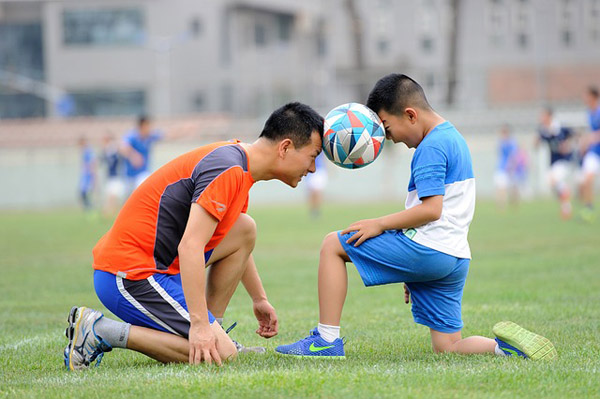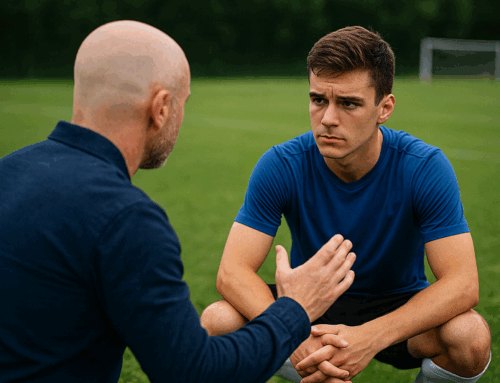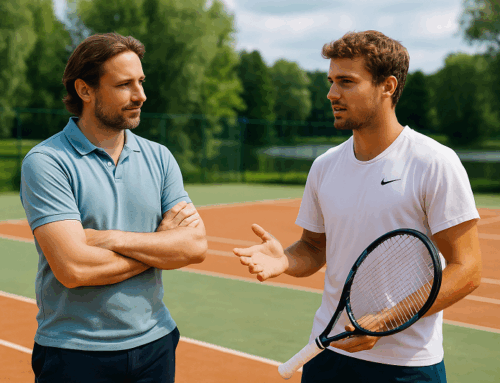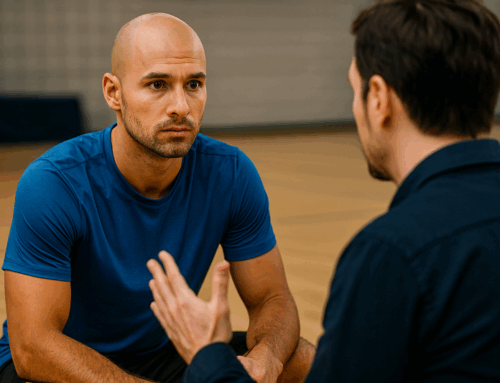Three Specialists Respond to Some Questions:
- Virginie Lemaire de Bressy – VL- (sports psychologist in France, Nice)
- Eric Medaets -EM- (sports sophrologist in Belgium)
- Manuel Dupuis -MD (sports psychologist and mental coach in Belgium)
- Could you introduce yourselves (education, experience) and explain the context in which you work with children in sports?
V L : I have a dual background: a Bachelor’s degree in Sports Sciences, a Master’s degree in Psychology, and a Ph.D. in Sports Psychology. I also hold coaching and NLP certifications. I have been working for 10 years with all types of athletes, including children.E M : Physiotherapist and sophrologist specializing in sports. Former basketball player and coach, I have been accompanying athletes from various disciplines for 47 years. Experience in Baby basketball (president of the FBBB), mental coach at the Francophone Tennis Association (AFT) for 4 years… Co-founder and president of Sport Expérience…
MD : I am a sports psychologist and mental coach since 2003, coordinating activities at Psychosport in Brussels. I see children and their parents in my office and sometimes on the field, addressing requests mostly related to stress management or building self-confidence in competition. Parents often suggest their children to see me, but sometimes the children ask for it themselves; in this case, they often heard that a friend or a sports idol sees a “mental coach” or a “sports psychologist,” and they want to do the same, thinking it will help them.
- What challenges do children face in the sports environment, and how do you help them in relation to this?
V L : In sports, every choice has visible consequences, as performance can quickly fluctuate. Young athletes are thus confronted quite early with their own responsibilities: if I train, I can improve and win, otherwise… This awareness of things develops a certain maturity that can be beneficial as it helps them learn from their difficulties. But it also risks taking away their childhood by depriving them of a part of innocence too soon. So, in my opinion, the important thing is to help children find ways to move forward without feeling guilty and how to find balance to thrive in their sport.E M : The first challenge is to protect them from the pressure exerted by their environment, avoiding “championitis.” The second objective is to maintain the notion of play, often absent at a certain level. The joy of playing is the essential element to activate without moderation.
MD : Children are exposed to the world of competition, pressure, and overtraining at an increasingly young age and in an increasingly intense manner. They exit the realm of the sport’s joy and play far too early and are faced with lifestyles that are quite challenging at this age, sometimes undermining their normal relationships with peers. Many identity and developmental challenges arise, sometimes leading to choices that the child is not really equipped to make. Stress often emerges when encountering the world of competition. Competition moments are often less successful than training.
- Do you think mental preparation is suitable for children, and from what age?
V L : For performance and feeling good in their sport, working on the mental aspect is important: increasing self-confidence, managing stress, being focused and motivated at the right time and in the right way, for example. On this point, it’s the same for children and adults. So, I think from the moment children are capable of setting goals for themselves, they can benefit from mental preparation, which is around 7 years old. However, personality and motivation are more important than age; the mental coach must be adaptable above all. Furthermore, children are in the process of constructing themselves, and everything they absorb shapes the future adults they will become. Thus, it’s important to help them manage failures and difficulties properly to avoid trauma and to enhance their skills and qualities so that they can rely on a solid foundation later.E M : Children don’t need mental training to play! Unfortunately, 75% of the athletes who come to see me are between 8 and 12 years old! This is not normal, and I consider this a failure of coaches who should be questioning themselves. Below the age of 12, I see the child along with their parents once or twice, no more, and I refuse to engage in longer follow-ups. Have you ever seen children playing football during recess or in a park? Do they need a mental coach? No, they are having fun, so let them play!
MD : I believe psychological support and mental training are often indicated, as it’s essential for the child to maintain a playful and enjoyable connection with the sport. It shouldn’t be this way, but talented children are put into intense competitive contexts very early, which is a source of stress and fatigue. This also challenges parents who are caught in extraordinary lifestyles and struggle to find the right role to play. Many athletes develop a “stressful” relationship with their sport, often leading them to not fully utilize their technical and tactical potential, and sometimes even quit (often in adolescence or pre-adulthood). Not all of them reach the highest level; they are, in fact, very rare…
- What types of requests do you receive to work with children in sports?
V L : Often, I receive children who feel uncomfortable in their sports practice but still want to continue training. This can be because they don’t find their place within the group, because they stress too much before an event, or because they are disappointed with their results and tend to belittle themselves. Once again, each request is unique and deserves special attention. Sometimes, a sports-related issue can reflect deeper issues in the personal or family realm, which should be addressed as soon as possible.E M : The requests mainly concern individual sports and often come from parents, sometimes from the coach, and rarely from the child themselves. The child doesn’t replicate their practice level in competition; they are stressed and overwhelmed by emotions… Almost all the athletes who come to see me, regardless of their age, are perfectionists who often end up in the frustration trap.
MD : Situations vary widely. Parents identify, sometimes correctly, sometimes incorrectly, something that isn’t working well with their child, which negatively impacts their performance (lower in competition than in training) or their well-being (the child seems demotivated, sad, or cries regularly), or both. They also sometimes identify attention deficits or a lack of competitiveness they find inappropriate. Thus, they come to me to address the issue.
- Can you briefly explain your approach to working with children?
V L : Children prefer to work with concrete supports; it’s easier to internalize an idea about oneself if they can visualize it. Thus, drawing, writing, constructing diagrams and adapted metaphors are a good basis for work. More and more, I also use cinematotherapy, which involves using cinematic media based on the child’s preferences. A movie or an animated film allows complex concepts to be approached through a character (who may experience similar difficulties) and leads to interesting discussions. The goal is to help the child discover alternative approaches for self-enrichment. Whatever tools we use, we must constantly adjust to allow children to communicate and assimilate new perspectives.E M : Very simply, by making them experience the game by “dramatizing” the situation. Helping them accept making mistakes, errors. Champions do everything to win, but they also accept defeat.
MD : Initially, I analyze the request and propose, or not, support. I conduct an assessment of the young person’s situation. Various scenarios exist. Most of the time, it’s recommended to establish a “mental training.” Based on the assessment, we work on specific points defined with the child (objectives), often in collaboration with the coach and/or parents. For example, stress management before a match or during crucial moments, self-confidence, what children call “daring” in competition. Depending on the situation, I also work with parents and coaches, trying to collaborate. Occasionally, I engage in more in-depth support in cases of pathological stress. Sometimes, I need to refer to a systemic psychologist.
After a series of mental training sessions including competition preparation, I conduct a small assessment with the child to measure progress. - What techniques do you use for mental training and competition preparation with children? Do you have any examples?
V L : There are as many ways to combine techniques as there are children. But to mention just two, you can work on breathing techniques that allow young athletes to calm down or activate themselves when they wish. It’s concrete and easy to implement. Visualization can also be used, accompanied by drawings to represent what was imagined. This technique opens up many possibilities: easier assimilation of new information, increased self-confidence, overcoming certain fears, or recovering more quickly after an injury or failure.E M : Simple techniques of conscious breathing: paying attention to exhalation, then inhalation, and describing the sensations physically, bodily, and mentally.
Adapted relaxation practices inspired by Jacobson’s progressive or differential relaxation. Making sensations consciously experienced, in movement and at rest.MD : I first set goals with the child using certain media, such as drawing or play.
I try to make the work accessible and stimulating for them, focusing on their attention and interest. The notion of pleasure is central because it’s not easy to address personal matters at this age. Being practical and simple is important. I work with images, sometimes stories, complicated situations that pose problems for the child. I use behavioral or psychocorporal techniques like breathing, meditation, or even sophrology… The child is invited to use a small notebook, which allows them to repeat exercises, remember, and progress. - Do you also work with parents and/or coaches? If so, can you explain how?
V L : Confidentiality is always paramount, of course, but open and chosen communication allows finding common strategies and avoiding disagreements and unspoken issues that can disrupt the athlete. So, I believe a systemic approach is important and offers advantages to all involved parties. Parents and coaches can adapt more easily to the child when they better understand their needs and processes. For example, we don’t motivate someone who needs recognition in the same way as someone who needs a challenge. The mental coach can benefit from varied feedback from the environment while maintaining necessary distance. Lastly, this shared involvement reminds the child that they are important because a real team is created around them, showing interest in what they feel to help them better. It’s another way to strengthen already strong bonds.E M : Yes, I always meet with parents during the first session and take this opportunity to define their role and warn them against certain excesses of high-level sports. I remind them that the child needs security, reassurance, and the best way to provide that is by simply staying in their parent role, without projecting onto their child and fulfilling a dream vicariously. When I accompany older athletes, I always work closely with the coach, who participates in sessions as often as possible. This allows providing tools to the coach, which they can apply in real situations on the field.
MD : Ideally, collaborating with the coach (with the athlete’s and parents’ consent) is beneficial; exchanging ideas with them and finding working approaches. They know the athlete well and see them during training and competition. This isn’t always possible because sometimes the child doesn’t desire it. I also conduct interviews with parents when it’s necessary or useful. Ideally, parents should maintain a parental position, which is supportive and not take on the role of a coach (although sometimes it works). My work is a space for the child, and my interactions with those around them enrich my interventions with the child. I also sometimes work exclusively with parents. Being a parent of a young athlete is not an easy task, and they also need help and advice. When family problems are too intense, I sometimes refer to a systemic psychologist.
More articles related to this theme:




